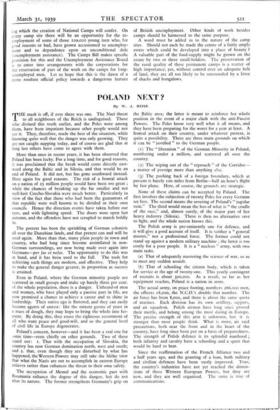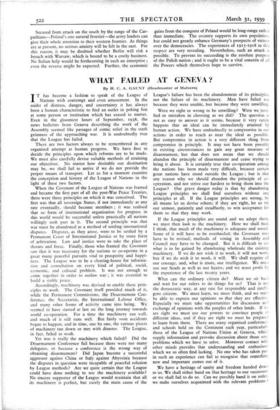POLAND NEXT ?
By W. J . ROSE
THE mask is off, if ever there was one. The Nazi threat to all neighbours of the Reich is undisguised. Those who divined this truth earlier, and the Poles were among them, have been impatient because other people would not see it. They, therefore, made the best of the situation, while knowing quite well that the danger was only growing. They are not caught napping today, and of course are glad that at long last others have come to agree with them.
More than once in recent years, it has been observed that Poland has been lucky. For a long time, and for good reasons, it was proclaimed that the break would come directly east- ward along the Baltic and in Silesia, and that would be an end of Poland. It did not, but has gone southward instead. Here again for good reasons. The risk of a frontal attack on a nation of 25 million people would have been too great ; while the chances of breaking up the far smaller and not well-knit Czecho-Slovakia were much better. Particularly in view of the fact that those who had been the guarantors of that republic were well known to be divided in their own councils. Hence the direction events have taken before our eyes, and with lightning speed. The doors were open last autumn, and the offenders have not scrupled to march boldly in.
The pretext has been the sprinkling of German colonists all over the Danubian lands, and that pretext can and will be used again. More than that, many plain people in town and country, who had long since become assimilated in non- German surroundings, are now being made over again into Germans—per fas et nefas. The opportunity to do this was at hand, and it has been used to the full. The tools for achieving such things are modern, and effective. They help to make the general danger greater, in proportion as success is attained.
Even in Poland, where the German minority people are scattered in small groups and make up barely three per cent. of the whole population, there is a danger. Unheard-of men and women, who have played only a passive part in life, are now promised a chance to achieve a career and to shine in leadership. Their native ego is flattered, and they can easily become agents of unrest: like the minute germs of yeast in a mass of dough, they may hope to bring the whole into fer- ment. By doing this, they rouse the righteous resentment of all who want peace and good-will, and so the general level of civil life in Europe degenerates.
Poland's concern, however—and it has been a real one for some time—rests chiefly on other grounds. Two of these stand out: 1. That with the occupation of Slovakia, the country has now German domination north, west and south; and 2. that, even though they are disturbed by what has happened, the Western Powers may still take the blithe view that what the Nazis are out to accomplish in eastern Europe relieves rather than enhances the threat to their own safety.
The occupation of Memel and the economic pact with Roumania enhance the degree of this danger, but do not alter its nature. The former strengthens Germany's grip on the Baltic area; the latter is meant to reinforce her whole position in the event of a major clash with the anti-Fascist Powers. The Poles know very well what it all means, and they have been preparing for the worst for a year at least. A frontal attack on their country, under whatever pretext, is quite a possibility. There are three main grounds on which it can be " justified " to the German people.
(r) The " liberation " of the German Minority in Poland, numbering under a million, and scattered all over the country.
(2) The wiping out of the " reproach " of the Corridor— a matter of prestige more than anything else.
(3) The pushing back of a foreign boundary, which at present is barely Ica° miles from Berlin—half an hour's flight by fast plane. Here, of course, the grounds are strategic.
None of these claims can be accepted by Poland. The first involves the subjection of twenty Poles for every German set free. The second means the severing of Poland's " jugular vein." The third would mean the loss of what is " the cradle of the race," and, almost surely, of the major part of her heavy industry (Silesia). There is then no alternative save to fight, and the whole nation knows this.
The Polish army is pre-eminently one for defence, and it will give a good account of itself. It is neither a " general muster," nor a professional force. The former could not stand up against a modern military machine ; the latter is too costly for a poor people. It is a " nucleus " army, with two main tasks.
(a) That of adequately mastering the science of war, so as to meet any sudden assault.
(b) That of schooling the citizen body, sit hich is taken for service at the age of twenty-one. This yearly contingent of recruits is about 300,000. As a result, so far as her equipment reaches, Poland is a nation in arms.
The actual army, on peace footing, numbers 266,000 men, the officers 18,000, the N.C.O.'s double that number. The air force has been 8,000, and there is about the same quota of marines. Each division has its own artillery, sappers, and air squadron. Polish airmen have long since proved their mettle, and belong among the most daring in Europe. The precise strength of this arm is unknown, but it is stronger than most people think. What is more, air raid precautions, both near the front and in the heart of the country, have long since been put on a basis of preparedness. The strength of Polish defence is its splendid manhood ; both infantry and cavalry have a schooling and a spirit that would be hard to beat.
Since the reaffirmation of the French Alliance two and a half years ago, and the granting of a loan, both military and civilian defences have been vastly improved. True, the country's industries have not yet reached the dimen- sions of those Western European Powers, but they are new, and they are well organised. The same is true of communications. Secured from attack on the south by the range of the Car- pathians—Poland's one natural frontier—the army leaders can give their whole attention to their western frontier. As things are at present, no serious anxiety will be felt in the east. For this reason, it may be doubted whether Berlin will risk a breach with Warsaw, which is bound to be a costly business. No Italian help would be forthcoming in such an enterprise ; even the reverse might be expected. Further, the economic gains from the conquest of Poland would be long-range rather than immediate. The country supports its own population, but could not greatly enhance Germany's prospects of victory over the democracies. The experiences of 1915-1918 in this respect are very revealing. Nevertheless, such an attack is possible. To prevent its. succeeding is the resolute purpose of the Polish nation ; and it ought to be a vital concern of all the Powers which themselves hope to survive.



































































 Previous page
Previous page